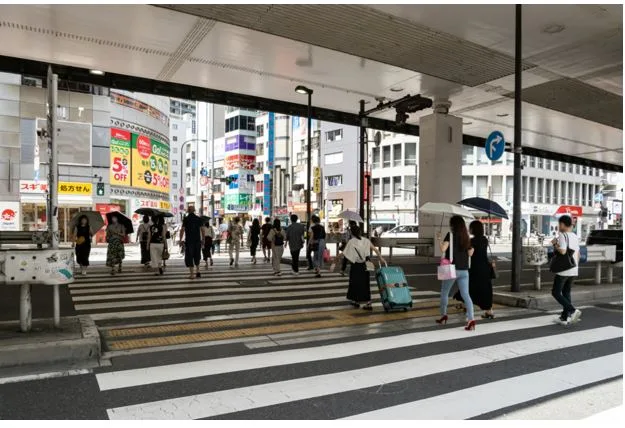Business Professionals Compare Living Costs Between Tokyo and Osaka
International professionals choosing between Japan’s two largest metropolitan areas face distinct trade-offs in cost, lifestyle, and business opportunities. Tokyo and Osaka represent different approaches to urban living, each offering unique advantages for expatriates and domestic professionals considering relocation.
Recent economic data shows significant differences in living costs, housing markets, and business environments between these cities. The choice between Tokyo and Osaka increasingly influences corporate expansion strategies and individual career decisions for professionals working in Japan.
Cost of Living Creates Stark Contrasts
Living expenses vary dramatically between Japan’s business capitals. Monthly costs for a single professional average $1,641 in Tokyo compared to $1,162 in Osaka, representing a 41% difference that significantly impacts long-term financial planning.
Housing represents the largest expense differential. Tokyo rental prices have increased 7.8% year-over-year, with central districts commanding premium rates for proximity to business centers. Osaka offers comparable amenities at substantially lower costs, particularly for larger living spaces.
Getting around Tokyo costs more money and takes longer. The train system works great, but monthly passes add up. Living somewhere cheap usually means long rides to work every day.
Osaka is smaller, so you don’t spend as much time or money getting around. People there also eat out more because the food is really good and doesn’t cost as much as Tokyo restaurants.
Housing Market Dynamics Differ Significantly
Tokyo’s housing market shows characteristics of a mature, internationally recognized market with strong foreign investment. Existing condominium prices in Tokyo reached ¥819,000 per square meter, reflecting demand from domestic and international buyers.
Osaka’s residential market has experienced strong growth with existing condominium sales increasing 4.5% to 17,119 units in 2024. Detached house sales surged 11.1% to 11,854 units, indicating robust demand across property types.
Professional housing preferences vary between cities. Tokyo professionals often choose compact, conveniently located apartments near business districts. Osaka professionals can afford larger living spaces while maintaining reasonable commutes to business centers.
New construction supply constraints affect both markets differently. Tokyo’s limited new development drives competition for existing properties, while Osaka’s development pipeline provides more options for professionals seeking modern amenities.
Business Environment and Career Opportunities
Tokyo serves as Japan’s undisputed financial and corporate headquarters hub. Major international corporations, government agencies, and financial institutions concentrate in Tokyo’s central business districts, creating dense professional networks and career advancement opportunities.
Osaka positions itself as western Japan’s business center with strengths in manufacturing, pharmaceuticals, and traditional Japanese industries. The city offers leadership opportunities for professionals willing to take on greater responsibilities in medium-sized companies.
Startup ecosystems differ substantially between cities. Tokyo attracts venture capital and international investment, supporting technology and finance startups. Osaka’s entrepreneurial scene focuses on manufacturing innovation and traditional industry modernization.
International business presence heavily favors Tokyo, where multinational corporations establish regional headquarters and major operations. Osaka hosts regional offices and manufacturing operations but fewer senior international positions.
Professional Development and Networking
Tokyo’s concentration of industry associations, professional organizations, and international business groups provides extensive networking opportunities. English-speaking professional communities are well-established across multiple industries.
Osaka offers closer-knit professional communities where individual contributions receive greater visibility. Senior positions often become available sooner for qualified professionals willing to relocate from Tokyo.
Educational and training opportunities favor Tokyo due to proximity to universities, business schools, and international training programs. Osaka professionals sometimes travel to Tokyo for specialized professional development programs.
Conference and industry event calendars heavily favor Tokyo, where international trade shows, conferences, and business events concentrate. This creates advantages for professionals requiring regular industry engagement.
Transportation and Infrastructure
Tokyo’s transportation infrastructure provides unmatched domestic and international connectivity. Narita and Haneda airports offer extensive international routes, while the shinkansen network enables efficient business travel throughout Japan.
Osaka’s transportation advantages include Kansai International Airport’s strategic location and efficient connections to Kyoto, Kobe, and Nara. The upcoming Linear Chuo Shinkansen will dramatically improve Tokyo-Osaka connectivity by 2037.
Daily commuting experiences differ significantly. Tokyo’s complex rail network enables living in diverse areas but requires longer average commute times. Osaka’s more compact urban structure allows shorter commutes from residential areas to business districts.
Business travel convenience favors Tokyo for domestic meetings due to central location and transportation hub status. Osaka provides easier access to western Japan markets and certain international destinations through Kansai Airport.
Quality of Life Considerations
Work-life balance perceptions vary between cities. Tokyo’s intense business culture demands longer working hours and more frequent business entertainment. Osaka maintains a more relaxed pace while preserving professional standards.
Cultural amenities reflect different strengths. Tokyo offers world-class museums, international entertainment, and diverse cultural events. Osaka provides authentic Japanese cultural experiences, traditional festivals, and renowned culinary traditions.
Family considerations often favor Osaka due to larger living spaces, lower costs, and less crowded environments. Tokyo provides more international schools and expatriate family support services.
Homes in Japan vary significantly between these cities in terms of size, cost, and amenities, requiring careful consideration of long-term lifestyle priorities and career objectives.
International Community and Language Support
English-language services and international communities are well-established in Tokyo across healthcare, legal services, and daily life needs. International professionals find comprehensive support systems for navigation Japanese bureaucracy and business practices.
Osaka’s international community is smaller but tight-knit, often providing more personalized support and faster integration into local business networks. Language requirements may be higher for certain professional positions.
Healthcare systems in both cities provide excellent service, with Tokyo offering more English-speaking medical professionals and international clinics. Osaka provides quality healthcare with potentially longer wait times for English-speaking specialists.
Banking and financial services cater extensively to international clients in Tokyo, while Osaka requires more navigation of Japanese-language financial services for complex professional banking needs.
Regional Economic Development Trends
Tokyo continues attracting new corporate headquarters and international investment, driven by government policies supporting financial sector growth and international business development. Major redevelopment projects around Tokyo Station and Shibuya maintain the city’s competitive edge.
Osaka benefits from increased tourism, Expo 2025 preparations, and integrated resort development. These projects create new business opportunities while potentially increasing living costs and changing neighborhood characteristics.
Infrastructure investment patterns favor both cities but with different focuses. Tokyo receives investment in transportation efficiency and urban redevelopment. Osaka benefits from tourism infrastructure and manufacturing facility modernization.
Professional relocation decisions between Tokyo and Osaka increasingly depend on individual career stages, industry sectors, and long-term lifestyle preferences rather than simple cost comparisons.
Future Outlook and Strategic Considerations
Demographic trends suggest continued growth in both metropolitan areas, though at different rates. Tokyo maintains appeal for young professionals entering competitive industries. Osaka attracts professionals seeking leadership opportunities and improved work-life balance.
Technology sector development shows divergent patterns. Tokyo dominates fintech, software, and international technology services. Osaka focuses on manufacturing technology, biotechnology, and traditional industry innovation.
Urban planning initiatives reflect different priorities. Tokyo emphasizes density management and transportation efficiency. Osaka promotes sustainable development and heritage preservation while accommodating growth.
Climate considerations may influence future decisions as both cities adapt to changing weather patterns. Osaka’s slightly more moderate climate and lower population density may provide advantages for long-term livability.
The choice between Tokyo and Osaka ultimately depends on balancing career ambitions, financial considerations, and lifestyle preferences. Professionals must evaluate immediate opportunities against long-term goals while considering industry-specific factors and personal circumstances that influence success in either metropolitan area.






